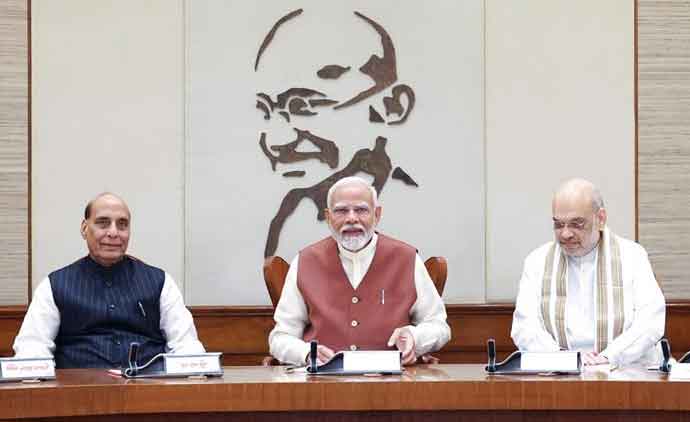In a significant move aimed at optimizing the functioning of various ministries, the Central Government has made a series of appointments and transfers under the purview of the Ministry of Personnel and Training. The reshuffle includes key appointments of prominent Indian Administrative Service (IAS) officers, each stepping into critical roles across different sectors. These changes, announced on Wednesday, reflect the government’s ongoing efforts to enhance efficiency and bolster leadership in various departments.
Neelam Shami Rao Appointed as the New Textile Secretary
Among the most notable changes, Neelam Shami Rao, a 1992 batch IAS officer from the Madhya Pradesh cadre, has been appointed as the new Secretary of the Ministry of Textiles. She will be replacing Rachna Shah, a 1991 batch IAS officer from the Kerala cadre, who has been reassigned to the Ministry of Personnel and Training as Secretary.
Currently serving as the Secretary of the National Commission for Minorities, Rao has an extensive career in public administration and governance. Her leadership in the textiles ministry will likely bring a new dimension to the textile industry, which is one of the cornerstones of India’s export economy. Rachna Shah, now appointed as the Secretary of the Department of Personnel and Training, will bring her wealth of experience to strengthen the civil services and bureaucratic processes.
Arunish Chawla Takes Over as Revenue Secretary
In another key development, Arunish Chawla, a 1992 batch IAS officer, has been appointed as the new Secretary of the Revenue Department under the Ministry of Finance. He will succeed Sanjay Malhotra, who has recently been appointed as the Governor of the Reserve Bank of India (RBI). Chawla, who was previously the Secretary of the Department of Pharmaceuticals, will continue to hold the additional charge of Secretary in the Ministry of Culture. This appointment is expected to bring a fresh perspective to the finance ministry, especially in the management of revenue and taxation policies.
Vineet Joshi Appointed Secretary of Higher Education
The Ministry of Education also saw a change in leadership with the appointment of Vineet Joshi as the new Secretary of Higher Education. Joshi, a 1992 batch IAS officer currently serving as the Chief Secretary of Manipur, takes over from K. Sanjay Murthy, who has been appointed to the prestigious role of Comptroller and Auditor General (CAG) of India. Joshi’s experience in the administration will be pivotal as he takes charge of shaping policies that govern India’s higher education sector.
Sanjay Sethi Appointed Secretary of National Commission for Minorities
In a reshuffle that affects the National Commission for Minorities, Sanjay Sethi, a 1992 batch IAS officer, has been promoted to the post of Secretary at the commission. Sethi, who has previously held key positions within the Ministry of Textiles, will now oversee the implementation of policies that safeguard the rights and interests of minorities across India.
Amit Agarwal Appointed as Secretary of Department of Pharmaceuticals
Amit Agarwal, a 1993 batch IAS officer from the Chhattisgarh cadre, has been appointed as the new Secretary of the Department of Pharmaceuticals, succeeding Arunish Chawla. Currently serving as the Director General of UIDAI, Agarwal brings a wealth of experience in managing large-scale systems and public sector projects. His leadership will be crucial as India continues to strengthen its pharmaceuticals industry, which is a key player in both domestic markets and global supply chains.
Neerja Shekhar to Lead DPIIT’s Directorate of Productivity
Neerja Shekhar, a 1993 batch IAS officer, has been temporarily promoted and appointed as the Director General of the Productivity Council under the Department for Promotion of Industry and Internal Trade (DPIIT). Shekhar will take over from S. Gopalakrishnan, a 1991 batch IAS officer, who has now moved on to serve as the Chairman of the Staff Selection Commission (SSC). Shekhar’s expertise in managing diverse portfolios will play a vital role in fostering productivity and industrial growth across India.
Implications of the Civil Services Reshuffle
These appointments signify the Indian government’s commitment to strengthening governance, enhancing operational efficiency, and ensuring a steady flow of leadership within the bureaucracy. The reshuffling of such high-level positions is not only a reflection of the government’s trust in these officers but also an indication of the dynamic nature of public administration in India.
Leadership in key sectors such as textiles, revenue, higher education, and pharmaceuticals will benefit from the diverse skill sets and years of experience that the new appointees bring. Economic growth, policy innovation, and improvements in administrative efficiency are expected as these experienced officers settle into their new roles.
Continued Evolution of Indian Bureaucracy
The Indian bureaucracy is often seen as the backbone of the country’s governance. These recent reshuffles are a continuation of the government’s broader agenda to revitalize the civil services and bring in professionals with specialized expertise to manage the demands of modern governance. The reshuffle has been meticulously designed to ensure that India’s public institutions continue to evolve in response to new challenges and emerging needs.
Moreover, these appointments underscore the importance of collaboration among various ministries and government departments to drive policy reforms that align with national priorities. The government’s strategic appointments aim to leverage the strengths of individual officers in a manner that ensures that the public sector delivers tangible benefits to the country’s citizens.
Looking Ahead: The Impact of These Key Appointments
As these new appointments take effect, all eyes will be on how the officers perform in their new roles and the impact of their leadership on the ministries they now helm. Whether it’s the Department of Pharmaceuticals under Amit Agarwal, the National Commission for Minorities led by Sanjay Sethi, or the Ministry of Textiles with Neelam Shami Rao at the helm, these reshuffles are poised to influence India’s policy direction for years to come.
In particular, the revenue department under Arunish Chawla, along with the education ministry guided by Vineet Joshi, will be under scrutiny for their roles in shaping critical aspects of India’s economy and education system. Similarly, the DPIIT’s Directorate of Productivity under Neerja Shekhar will play a pivotal role in boosting India’s industrial competitiveness and entrepreneurial landscape.
These significant appointments and transfers are not just routine changes, but are aimed at providing the Indian government with the leadership necessary to adapt to the evolving challenges of the nation. As these new secretaries step into their respective roles, the focus will undoubtedly be on improving governance, fostering growth, and ensuring that India remains at the forefront of global progress.
By placing experienced officers in crucial ministries, the Central Government has demonstrated its intent to maintain momentum in its efforts to create a more efficient, transparent, and responsive government for the people of India. As these leaders embark on their new journeys, the nation eagerly anticipates the outcomes of their leadership in shaping the future of India.















